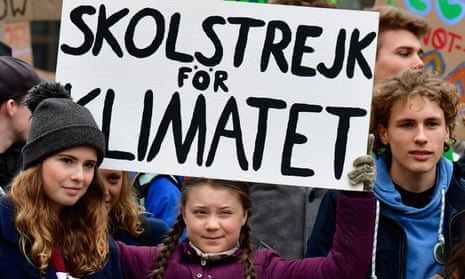It is an ill wind that blows no one any good. Even the buffeting by the gale of rightwing nationalist parties in the European elections has a bracing message: that the environment is back on the political agenda. Recent months have seen a dramatic rise in the profile of green issues, following last year’s warning from the UN that the window of opportunity for action on emissions has shrunk to 12 years. The remarkable achievement of Swedish teenager Greta Thunberg and the school strikes movement she launched, combined with advances by Green parties across Europe and the embrace of a Green New Deal by many potential Democratic presidential candidates, has been to shift the political mood in such a way as to give reason for hope as well as dread.
Most European school strikers can’t vote (except in Austria, where the voting age is 16). Even if they could, the scope of the European parliament to enact the measures they would like to see, to limit global heating or protect wildlife, should not be exaggerated. MEPs elect the commission president – a decision of profound importance. But the power to propose legislation rests with the commission, while the EU’s negotiating position at next year’s crucial round of UN climate talks – where the Paris agreement takes force and states agree new targets – will be agreed by the council, made up of leaders of member states.
But a strong result for Green politicians, and enlargement of their group of 50 MEPs to nearer 60, would show the world that a significant portion of the bloc’s 400 million voters recognise the gravity of the existential crisis confronting humanity. It would signal to politicians that action on climate, allied to a humane approach to migration, ranks high among voters’ priorities. In the run-up to a conference called by the UN secretary general, António Guterres, in September, it is impossible to overstate how important this is.
For green activists and politicians, the past year has had elements of the best and worst of times. In Sweden there are five Green ministers. Recent polling shows Dutch and German Greens have overtaken other left parties. Last year Amsterdam became the first Green-led European capital city, while English Greens made gains in this month’s local elections following a period of energetic activism, a landmark David Attenborough documentary and a warning on climate from the Bank of England.
In the US too, advances by progressive Democrats in last year’s midterms marked a shift into the mainstream for environmental politics. Policies such as massive state investment in renewable energy and the ending of fossil fuel subsidies are no longer pie in the sky. In some quarters, at least, the requirement to re-engineer the global economy and end our dependence on carbon is being taken seriously.
Against this backdrop, the Australian election result at the weekend was a brutal shock. Climate science denial thrives, notably fostered by presidents in the US and Brazil. In the Indian election, the environment hardly figured. France’s president U-turned on green taxes last year after they sparked gilets jaunes protests. In southern and eastern Europe green concerns have not escaped their niche, and are hemmed in by priorities such as unemployment.
To halt the advance of rightwing populism and its anti-EU, anti-migrant rhetoric is the most urgent task facing Europe’s voters this week. In Spain, Denmark, Portugal and elsewhere, social democratic parties have staged recoveries. This is positive. But the role of Green politicians must not be overlooked, particularly when climate science denial is a key motif of the 21st-century far right. The EU has many flaws, but in the struggle for a global solution to the climate emergency it is a crucial player. A confident, expanded Green group in its parliament would guide policy in a rational, anti-carbon direction, and champion the cause of progressive internationalism.
